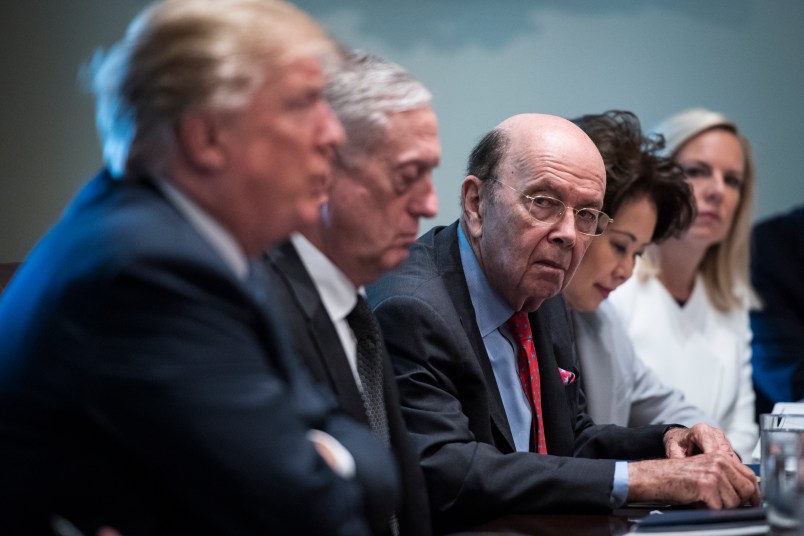The topic of congressional apportionment — where a change to how U.S. House seats are doled out could boost Republicans while diminishing the political power of urban and diverse communities — came up in an August 2017 email exchange between two top Commerce Department officials as they discussed a memo related to the Trump administration’s move to add a citizenship question to the census form.
The email exchange is the latest example of the topic being raised in the internal records that have been made public in the lawsuits against Commerce Secretary Wilbur Ross for adding the question to the 2020 survey. When Ross announced in March he was adding the question, he claimed the reason was “solely” because the Justice Department requested it for the purpose of enforcing the Voting Rights Act.
On August 11, 2017, Commerce Department attorney James Uthmeier emailed Earl Comstock, a Ross aide, about edits to a draft memo Uthmeier was preparing for Ross about adding the question.
“I have some new ideas/recommendations on execution that I look forward to discussing,” Uthmeier wrote. “Ultimately, we do not make decisions on how the data should be used for apportionment, that is for Congress (or possibly the President) to decide. think that’s our hook here.”
Currently, non-citizens are included in the decennial census that is used to set the number of U.S. House seats each state gets. Excluding undocumented immigrants from that count has long been a goal of the right; the state of Alabama, which stands to lose a congressional seat after the next census, is currently suing the Census Bureau to do so.
Similarly, conservatives have sought to draw state legislative districts based on the number of citizens, rather than the total population — most recently in an unsuccessful Supreme Court case that sought to end the use of total population in redistricting.
A study done during that Supreme Court case found that drawing state legislative districts based on voting-age citizens, rather than total population, would require more than half of all districts to be “substantially changed” in a way that would “substantially favor increasing the number of Republican-dominated districts.”
Last spring, Missouri state GOP legislators tried and failed to put on November’s ballot a ballot initiative that would have let them draw districts based on number of citizens rather than total population.
The Commerce Department has never publicly said that Ross sought the citizenship question to aide Republicans in their quest to change how legislative seats are apportioned and drawn.
However, there are hints throughout the records that have been released with the litigation that suggest such a consequence was at least discussed.
Kansas Secretary of State Kris Kobach, in an email to Ross in July 2017, said that they had discussed a few months prior adding a version of the question for the purpose of excluding undocumented immigrants from congressional apportionment.
Ross had previously, in March 2017 received an email from Comstock titled “Your Question on the Census” that confirmed non-citizens were included in congressional apportionment and included a link to a Wall Street Journal column about the use of smaller-scale surveys, rather than the comprehensive decennial census, to count immigrants.
The August 2017 email exchange was released Sunday with court filings from the challengers in a federal lawsuit brought in New York against the administration. In the email, Uthmeier also suggests that Comstock use another Commerce aide to hand-deliver any handwritten notes he might have about the draft memo.
The challengers are asking a federal court to force the Justice Department to turn over a handwritten note that Uthmeier provided to DOJ official John Gore, when sending him a memo about adding the citizenship question.
“[T]he decision to hand-deliver a memo with a handwritten note that could easily have been emailed, and other evidence that Commerce officials were mindful of the record they were creating … suggest that the note contains relevant evidence of the Commerce Department’s intent not available from another source,” the challengers wrote.
U.S. District Judge Jesse Furman on Monday morning ordered the Justice Department to turn over the note for him to review by Tuesday afternoon, along with its arguments for why it should not be produced for the challengers.
The trial is set to begin Nov. 5. The Justice Department has failed to convince the district court, or an appeals court, to delay it while it asks the Supreme Court to intervene in blocking a deposition and extra discovery that the challengers have sought.
Read the full filings, including the email exchange, from the challengers below:







Lying liars and the lies they tell. And yeah, trying to circumvent records laws does kinda suggest something about intent.
I’m starting to wonder if anything Ross says is truthful. He’s lied, both by commission and omission about his net worth for over a decade (fictitious $2 billion), he’s lied repeatedly (under oath) about the census question, he’s lied about myriad stock trades, and been accused of stealing from multiple business partners. This is by no means a comprehensive list. Why is he still working in the White House? Because his boss and co-workers are bigger liars. It’s a festival of thieves, merrily looting our country.
No collusion, no collusion, nothing says that any coordination took place…
I’m starting to wonder if anything Ross says is truthful.
Narrator: Nope.